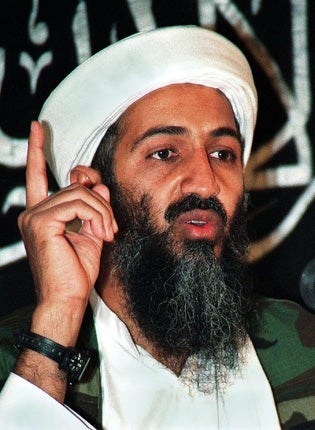Bin Laden speaks as Obama considers Afghan troop surge
Video message promises to continue 'war of attrition' against US and Nato allies

Your support helps us to tell the story
From reproductive rights to climate change to Big Tech, The Independent is on the ground when the story is developing. Whether it's investigating the financials of Elon Musk's pro-Trump PAC or producing our latest documentary, 'The A Word', which shines a light on the American women fighting for reproductive rights, we know how important it is to parse out the facts from the messaging.
At such a critical moment in US history, we need reporters on the ground. Your donation allows us to keep sending journalists to speak to both sides of the story.
The Independent is trusted by Americans across the entire political spectrum. And unlike many other quality news outlets, we choose not to lock Americans out of our reporting and analysis with paywalls. We believe quality journalism should be available to everyone, paid for by those who can afford it.
Your support makes all the difference.In a new message to the American people, Osama bin Laden has declared that President Barack Obama is powerless to end the West's "hopeless" war in Afghanistan, and is merely continuing the failed policies of George Bush before him.
In the 11-minute audiotape, issued on radical Islamic websites yesterday – as the White House weighs a controversial increase in US troop strength in Afghanistan – the al-Qa'ida leader warns that Washington and its Nato allies face growing guerrilla resistance. "If you end the war, so be it," says the voice on the tape, posted over a still photograph of Bin Laden. But if not, "all we will do is continue the war of attrition against you in all possible directions."
A Bin Laden address in the days around each 9/11 anniversary has become an annual event. But this particular message (assuming it is genuine – and no expert has suggested it is not) comes at a particularly sensitive time for both the speaker and his audience.
By all accounts, al-Qa'ida has taken heavy blows of late in its strongholds in Pakistan. In Afghanistan, however, Washington and its allies are having more trouble than ever in countering an insurgency that has seen a revitalised Taliban gain control of swaths of the countryside and pose a new threat to Kandahar, Afghanistan's second largest city.
At the same time, the war is losing both public and political support in the US, amid mounting American casualties, reports of Nato airstrikes that appear to have killed dozens of innocent civilians, and evidence that the country's recent presidential election was riddled with corruption.
The administration is currently consulting with General Stanley McChrystal, the commander of allied forces in Afghanistan, whether and how far to boost US troop strength beyond the 68,000 ceiling already approved for deployment by the end of the year. But any increase could be highly problematic. According to Robert Gibbs, the White House spokesman, a decision is unlikely for "weeks and weeks", and will probably not be taken until the effects of the latest surge can be measured. In the meantime, Obama officials will brief Congressional leaders on the discussions with General McChrystal.
Already, however, the President is facing serious rumblings of dissent in his own ranks. First Nancy Pelosi, the Speaker of the House of Representatives, publicly warned that neither Capitol Hill nor ordinary voters are in the mood for sending more troops to a war that has already taken almost 900 American lives – and 51 in August alone.
Then Senator Carl Levin, the chairman of the powerful Senate Armed Services Committee, declared that no more US troops should be sent until there had been "a surge in the number of Afghan security forces". Mr Obama thus could soon find himself in a similar position to Mr Bush who, in defiance of public opinion, carried out his Iraq surge in 2007. If anything, however, a boost in US forces now would be even trickier in political terms.
Join our commenting forum
Join thought-provoking conversations, follow other Independent readers and see their replies
Comments